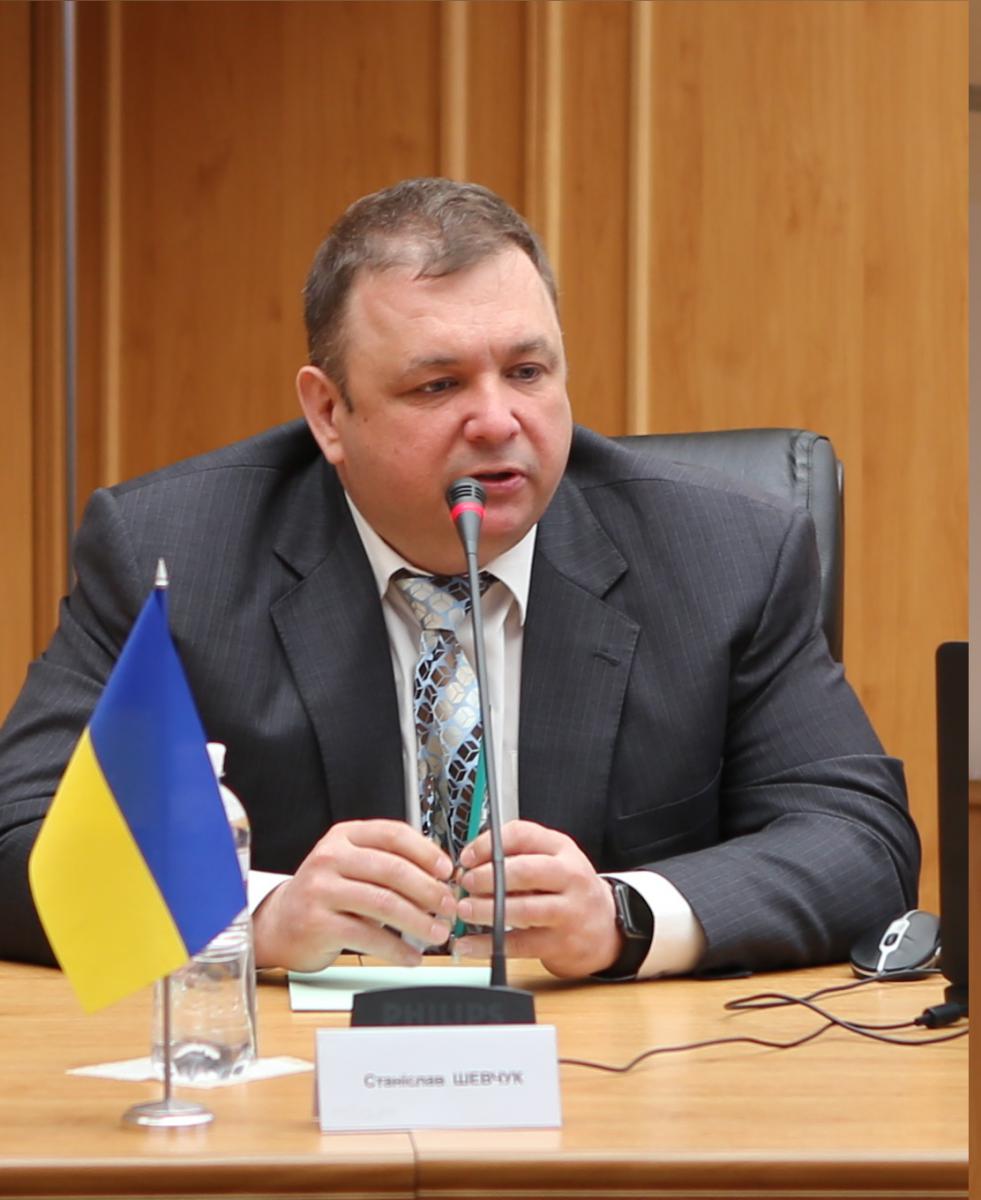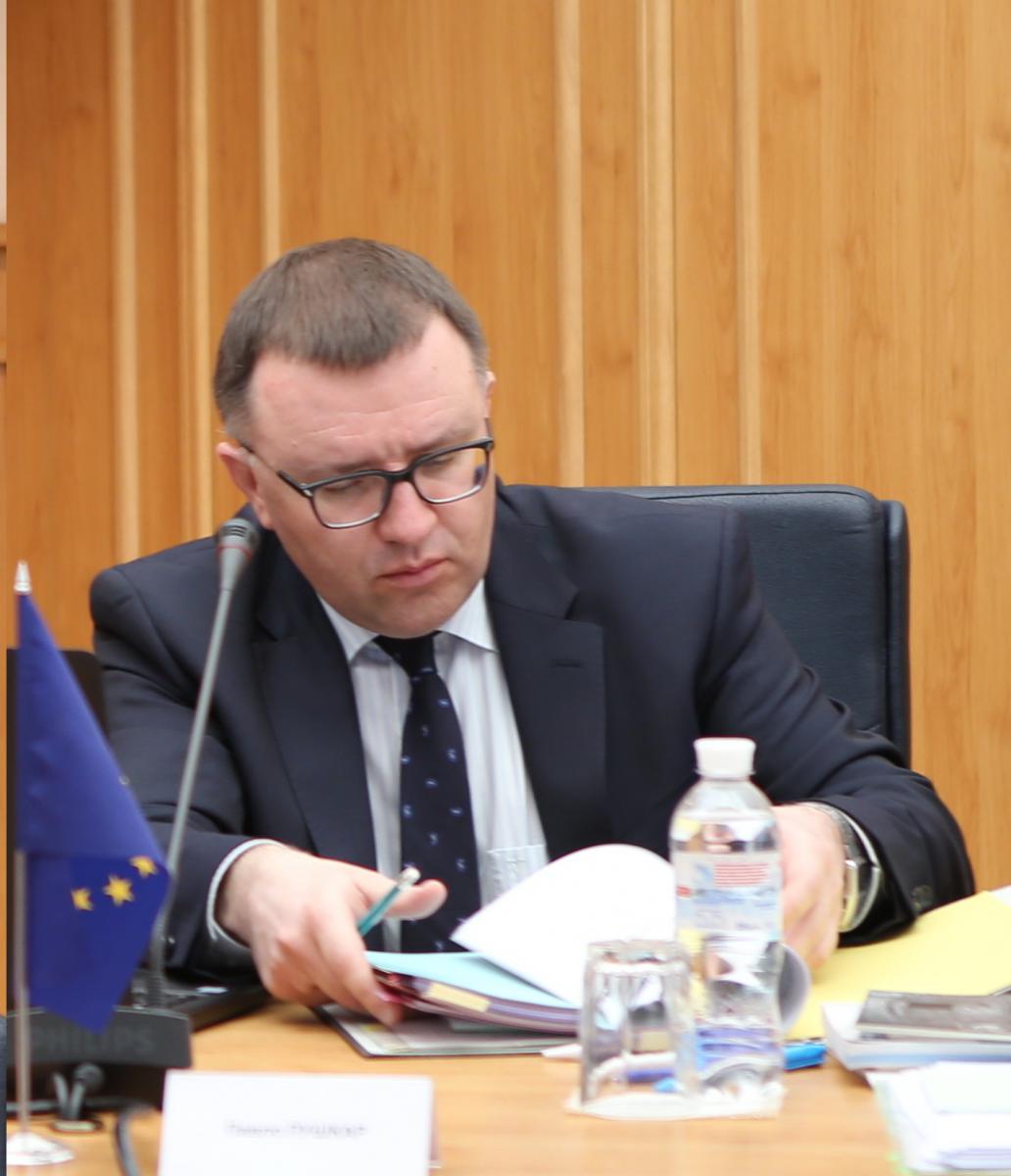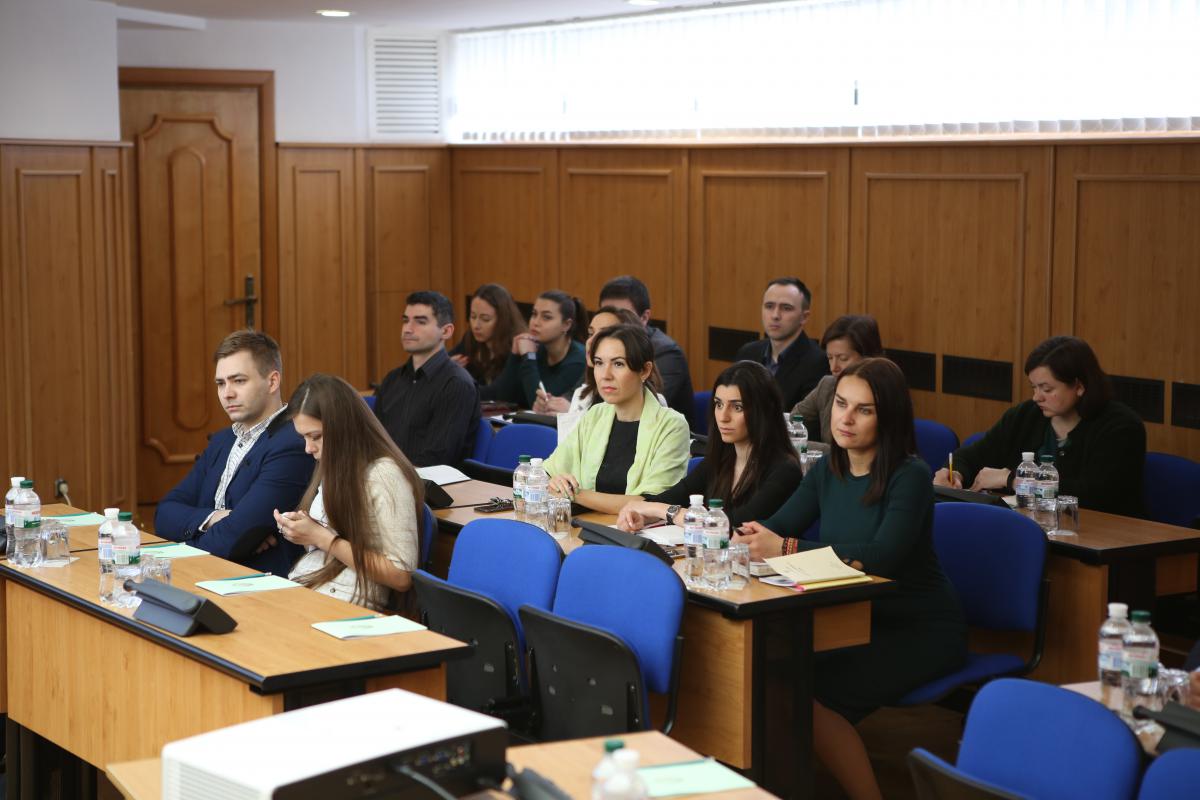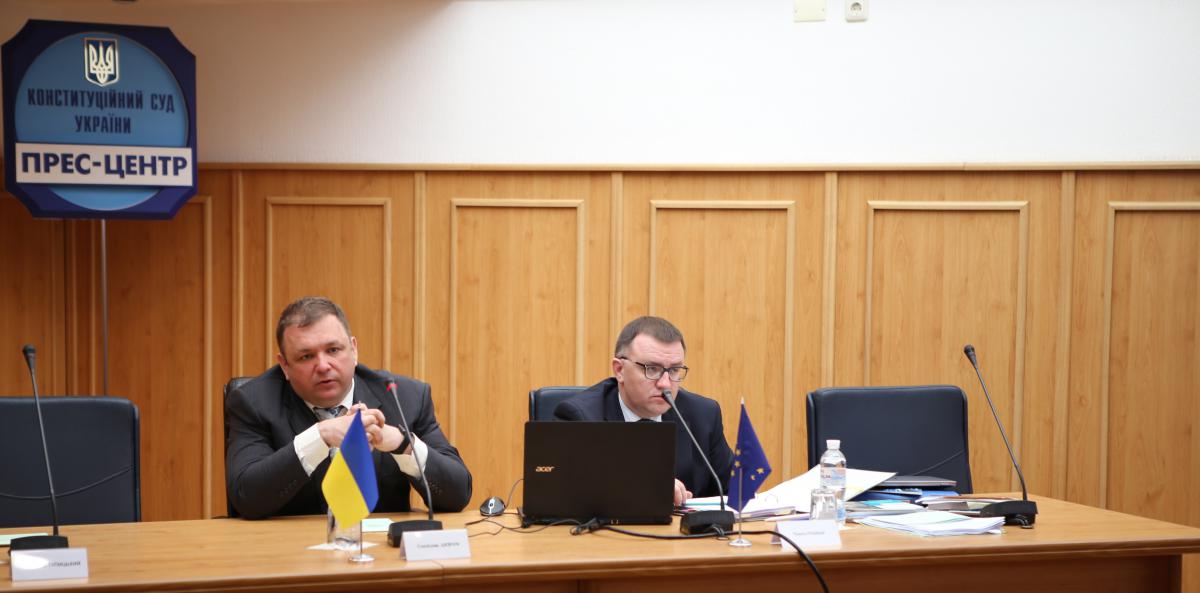Professional meeting on the implementation of the ECHR judgements
On April 16, 2018 the professional meeting with the Head of Division for the Execution of ECHR Judgments, Directorate General of Human Rights and Rule of Law of the Council of Europe Pavlo Pushkar on the implementation of the European Court of Human Rights judgements was held in the Constitutional Court of Ukraine.
Chairman of the Constitutional Court of Ukraine Stanislav Shevchuk, Judge of the Constitutional Court of Ukraine Viktor Horodovenko, Head of the Secretariat of the Constitutional Court of Ukraine Yaroslav Vasylkevych, the employees of the Secretariat of the Court took part in the event.
 In his speech, Chairman of the Constitutional Court Stanislav Shevchuk noted that the Constitutional Court of Ukraine plays a special role both in the protection of constitutional rights and freedoms and in guaranteeing the Convention in Ukraine. He stressed that the main task of the Constitutional Court of Ukraine is to protect the Constitution, however, he noted that the legal nature of international and national law is the same. "In defending human rights, we must act in cooperation with the European Court of Human Rights," stated the Chairman of the Constitutional Court of Ukraine.
In his speech, Chairman of the Constitutional Court Stanislav Shevchuk noted that the Constitutional Court of Ukraine plays a special role both in the protection of constitutional rights and freedoms and in guaranteeing the Convention in Ukraine. He stressed that the main task of the Constitutional Court of Ukraine is to protect the Constitution, however, he noted that the legal nature of international and national law is the same. "In defending human rights, we must act in cooperation with the European Court of Human Rights," stated the Chairman of the Constitutional Court of Ukraine.
The Constitutional Court of Ukraine has so far managed to form the basis of the doctrine of friendly attitude to international law in adopting decisions and providing opinions, noted Stanislav Shevchuk. "We cannot act contrary to the case law of the European Court of Human Rights in our decisions", he continued.
Chairman of the Constitutional Court of Ukraine also drew attention to the decision in the case on the constitutional petition of the Ukrainian Parliament Commissioner for Human Rights concerning the compliance of the Constitution of Ukraine (constitutionality) with the provision of the third sentence of Article 315.3 of the Criminal Procedure Code of Ukraine. He noted that according to this decision, without a petition of the prosecutor a judge cannot extend the detention period, as it contradicts the Constitution of Ukraine. "This is one of the solutions, which motivation is modern and European", added the Chairman.
In the reasoning part of this decision, the Court referred to the case law of the European Court of Human Rights, according to which detention without a relevant judicial decision, especially in the period after the investigation and before the trial, as well as on the basis of judgments rendered at the stage of judicial review, which do not contain definite terms of further detention, contradicts the requirements of Article 5 of the Convention (paragraph 98 of the judgment dated February 10, 2011 in the case of Kharchenko v. Ukraine). According to Stanislav Shevchuk, this approach is consistent with the purpose of Article 5 of the Convention, to prevent arbitrary or unjustifiable imprisonment.
The Court’s Chairman also noted that in this decision the Constitutional Court of Ukraine had formulated the principle of impartiality, because the Court should be perceived as an independent body with sufficient guarantees to exclude any legitimate doubts about this. "When the judge prolongs detainment without the request of the prosecutor, he automatically accedes to the prosecution," he added.
 The Head of Division for the Execution of ECHR Judgments, Directorate General of Human Rights and Rule of Law of Council of Europe Pavlo Pushkar said that there are two parallel processes: consideration of cases in the European Court of Human Rights and consideration of cases in the Constitutional Court of Ukraine.
The Head of Division for the Execution of ECHR Judgments, Directorate General of Human Rights and Rule of Law of Council of Europe Pavlo Pushkar said that there are two parallel processes: consideration of cases in the European Court of Human Rights and consideration of cases in the Constitutional Court of Ukraine.
He stressed that the Constitutional Court of Ukraine in its decisions should consolidate its legal position in accordance with international law. "It is important to show the European constitutional community that Ukraine is ready to resolve the issues at the highest legal level", he continued.
Pavlo Pushkar informed that one of the tasks of the European Court of Human Rights is to provide information to enhance the dialogue between the ECHR and the Constitutional Court of Ukraine case law. He also emphasised the strengthening of the professional level of the Secretariat of the Constitutional Court of Ukraine with a view to enhancing the institutional capacity in applying the case law of the European Court of Human Rights. "It is important that the position stated in the ECHR judgment should be understood by the Constitutional Court of Ukraine", he said.
Ukraine takes the third place as to the number of applications to the European Court of Human Rights, noted Pavlo Pushkar. He said that since 1997, about 1,400 judgments have been adopted with respect to Ukraine, 14% of which are under the special control of the Committee of Ministers of the Council of Europe. According to the speaker, in 2011-2017 Ukraine has paid 1,500,000,000 hryvnas in the part of satisfaction the ECHR judgements. Execution of the European Court of Human Rights judgments is an international obligation of the country and a collective commitment of all state bodies, stressed Pavlo Pushkar.
The Head of Division for the Execution of ECHR Judgments, Directorate General of Human Rights and Rule of Law of Council of Europe explained the details of the process that takes place after the ECHR judgments are adopted. "The Ministry of Justice develop a systematic, strategic approach to the implementation of the ECHR judgments", stated the speaker.
He also noted the importance of the Decision of the Constitutional Court of Ukraine Decision in the case on the constitutional petition of the Ukrainian Parliament Commissioner for Human Rights concerning the compliance with the Constitution of Ukraine (constitutionality) of the provision of the third sentence of Article 315.3 of the Criminal Procedure Code of Ukraine. "Now it is necessary to understand how this Decision of the Constitutional Court of Ukraine has affected the judicial practice in the country", he said.
In addition, Pavlo Pushkar dwelled in detail on the issue of the lawfulness of the detention in the cases of “Chanev v. Ukraine” and “Ignatov v. Ukraine”. He drew the attention of those present to a general and analytical assessment of the influence of the Criminal Procedure Code of Ukraine on the situation regarding detention. According to the speaker, the application of the preventive measure is possible only if there is a reasonable suspicion.
Pavlo Pushkar dwelled in detail on the case of the "Shvydka v. Ukraine". In his opinion, there was no criminal offense in this case, so there could be no appeal. According to the speaker, the applicant was punished for political views, and not for a criminal offense.
He also said that in the European countries, particularly in Germany and France, a simplified mechanism for dealing with criminal offenses has been in effect for a long time, which in Ukraine, in general, is shouldered on judges. He stressed that it is necessary to simplify this mechanism by removing the consideration of such cases from the courts’ competence.
 During the event, the participants discussed other pressing issues of implementing the ECHR judgments. The Chairman of the Constitutional Court of Ukraine Stanislav Shevchuk noted that such meetings should become regular, since the Constitutional Court of Ukraine only starts to consider constitutional complaints and needs the support of the Council of Europe.
During the event, the participants discussed other pressing issues of implementing the ECHR judgments. The Chairman of the Constitutional Court of Ukraine Stanislav Shevchuk noted that such meetings should become regular, since the Constitutional Court of Ukraine only starts to consider constitutional complaints and needs the support of the Council of Europe.
The participants agreed on further cooperation within the framework of the constructive dialogue initiated between the Constitutional Court of Ukraine and the Division for the Execution of ECHR Judgments of Council of Europe in order to strengthen the institutional capacity of the Constitutional Court of Ukraine and the comprehensive application of the ECHR case law in the jurisprudence of the Constitutional Court of Ukraine.


